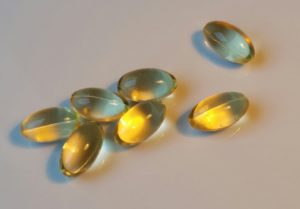 Many people complain of frequent colds and upper respiratory infections. Perhaps even every month. This is an especially big problem for those suffering from chronic sinusitis, because every cold and sore throat also leads to a sinus infection. So a goal is to try to reduce the number of infections, and daily vitamin D supplements may be the answer.
Many people complain of frequent colds and upper respiratory infections. Perhaps even every month. This is an especially big problem for those suffering from chronic sinusitis, because every cold and sore throat also leads to a sinus infection. So a goal is to try to reduce the number of infections, and daily vitamin D supplements may be the answer.
Many studies have looked at vitamin D supplementation, at all sorts of doses, for all sorts of health conditions, including cancer. Unfortunately, when properly done studies with people randomly assigned to different groups are done, then all sorts of correlations don't hold up, or mixed results. Right now it appears that the main positive benefit of vitamin D supplements is lowering the incidence of upper respiratory illnesses that a person gets. Another study just confirmed this finding.
An international team of researchers reviewed data from 43 studies (48,488 participants), and found a small but significant protective effect of vitamin D supplementation in lowering the risk of getting a respiratory infection (when compared with a placebo). The studies revealed that the protective benefits of vitamin D supplements were strongest in 1 to 16 year olds who took between 400 to 1000 IU daily for up to 12 months.
Interestingly, and this may really bother high dose vitamin D advocates, the researchers found that lower doses (400 to 1000 IU daily) had a positive health effect, but NOT larger daily doses. They found that data from 4 recent good studies (with persons randomly assigned to different groups) in which vitamin D was given at daily dose equivalents of 2000 IU/day or more for 2 to 5 years had NO EFFECT. In other words: null data.
These differing findings suggest that frequency (daily is better then weekly or monthly), dose, and duration (no more than 12 months) of vitamin D supplementation are key to its protective effects against respiratory illnesses. It is unclear why higher doses are NOT protective, while smaller doses are protective. It's like the saying: Less is more.
Excerpts from Medical Xpress, which actually is misleading in how the conclusions of the study are described: New research on vitamin D and respiratory infections important for risk groups
Studies have shown that supplementary vitamin D seems to provide a certain degree of protection against respiratory infections. A new study involving researchers from Karolinska Institute has now made the most comprehensive synthesis to date of this connection. The study, which is published in The Lancet Diabetes & Endocrinology, confirms that vitamin D protects against respiratory infections, a result that can have significance for the healthcare services. [NOTE: Protective effect was seen in the 1 to 16 year old age groups, and not other age groups.]
Whether vitamin D can reduce the risk of infection is a still an open issue. Four years ago, a synthesis of current research was published that showed that vitamin D supplementation can provide a certain degree of protection against respiratory infections.
Now, the same researchers from, amongst other institutes, Karolinska Institutet, Harvard Medical School and Queen Mary University of London, have expanded the earlier material with an additional 18 studies and carried out new analyses.
Their results are based on 43 randomized and placebo-controlled studies on the possible relationship between vitamin D and respiratory infections involving almost 49,000 participants.
While the total protective effect against respiratory infections was 8%, the researchers found, for example, that a daily dose of vitamin D is much more effective than one given every week or month. There is no reason, either, to exceed the recommended dose.
"A particularly high dose doesn't seem necessary," says study co-author Peter Bergman, associate professor at the Department of Laboratory Medicine, Karolinska Institutet. "Those who received 400-1000 IU/day had the best response, as the group that received such a dose demonstrated a reduction in infection risk of 42%. I want to stress that there were no signals in the study that normal doses of vitamin D were dangerous or caused adverse reactions."
